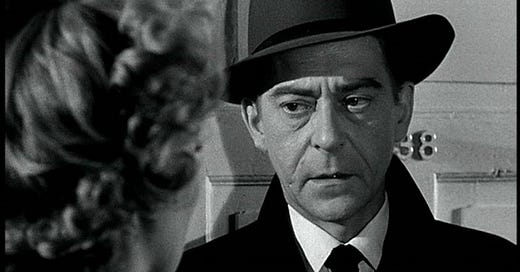Our first international noir was actually directed by an American. An exiled, blacklisted American who couldn't find work in Europe, until Rififi came his way. Jules Dassin's previous noirs, in particular The Naked City (1948), have that matter-of-fact, docu-style grittiness that he came to be associated with, but with Rififi he took that to a whole new level. This was his first non-American film and one gets the impression he used his own frustrations to inform the work.
Based on the novel ‘Du Rififi Chez Les Hommes’ by Auguste Le Breton, Rififi stars Jean Servais as Tony 'le Stephanóis', a gangster who's just come out of prison and, wouldn't you know it, he wants to do a heist. He gathers his men: his protegé Jo (Carl Möhner), Mario (Robert Manuel), who came up with the original plan in the first place, and safecracker Cesar, played by Dassin himself. Think of it as the French Asphalt Jungle.
'Poker all night in a smoke-filled room. Just what you need! Go to the country. Get some air in your lungs.' Jo
’You see me milking cows?' Tony
At first, Rififi feels like another noir heist caper. A crook just got out, he finds out his ex-girlfriend is seeing someone else, he decides he wants to do another job, he gets his people, so on and so forth. It's a pretty standard story, with the usual noir beats. Until it happens. By 'it', I mean the actual heist. And that's down to Tony.
One of noir's most unlikeable lead characters, Tony 'le Stephanóis' is a deeply troubled man. A violent man, and scarily calculating, he is greedy and manipulative, and he surrounds himself with the who's who of Paris' metaphorical Gangsters Hall of Fame. You can guess how this ends. While he initially declines Mario's offer to do a robbery, he changes his mind when he learns that his ex Mado (Marie Sabouret) has been seeing someone else. He gets extremely violent with her and right there, the film has no qualms about showing Tony in a horrible light. We're not meant to like him. We're not meant to understand him. His only saving grace is his apparent loyalty to his friends.
'I liked you. I really liked you. Macaroni. But you know the rules.' Tony
Those friends, of course, come in handy in the now iconic Mappin and Webb's heist scene. The four of them concoct an ingenious, meticulous and perfectly detailed heist, and unlike The Asphalt Jungle, which shows the planning, a little bit of the heist, and the aftermath, or Reservoir Dogs, which shows only the aftermath, Rififi shows us the heist. All 32 minutes of it. With no dialogue whatsoever. Four men conduct an entire heist for over half an hour and we are glued to the screen. It is quite simply one of the greatest scenes in cinema history. And the greatest without dialogue. Absolutely phenomenal.
After that, everything comes crashing down. By the film's third act, we realize all of that was for nothing. The ending is as bleak as anything ever put on screen, with a set of particularly brutal deaths, and for what? Greed? Jealousy? Emptiness? Whatever it was, it was Tony's doing. He brought it on himself and everybody else. In that regard, he is a stereotypical noir character. His arc is familiar to us. We've seen that. We've seen characters like him in film noir. He started with nothing, and he ended with even less than that...
We bid farewell to Tony 'le Stephanóis' and Rififi. Our next loser is a wicked femme fatale if there ever was one. The film is Out of the Past (1947), the actress is Jane Greer and the loser... is Kathie Moffat.
See you on the sunny side of the street.





I just saw it recently because you said you would be discussing it. An excellent caper movie that hadn’t aged at all.
I always feel a little sorry for Tony.